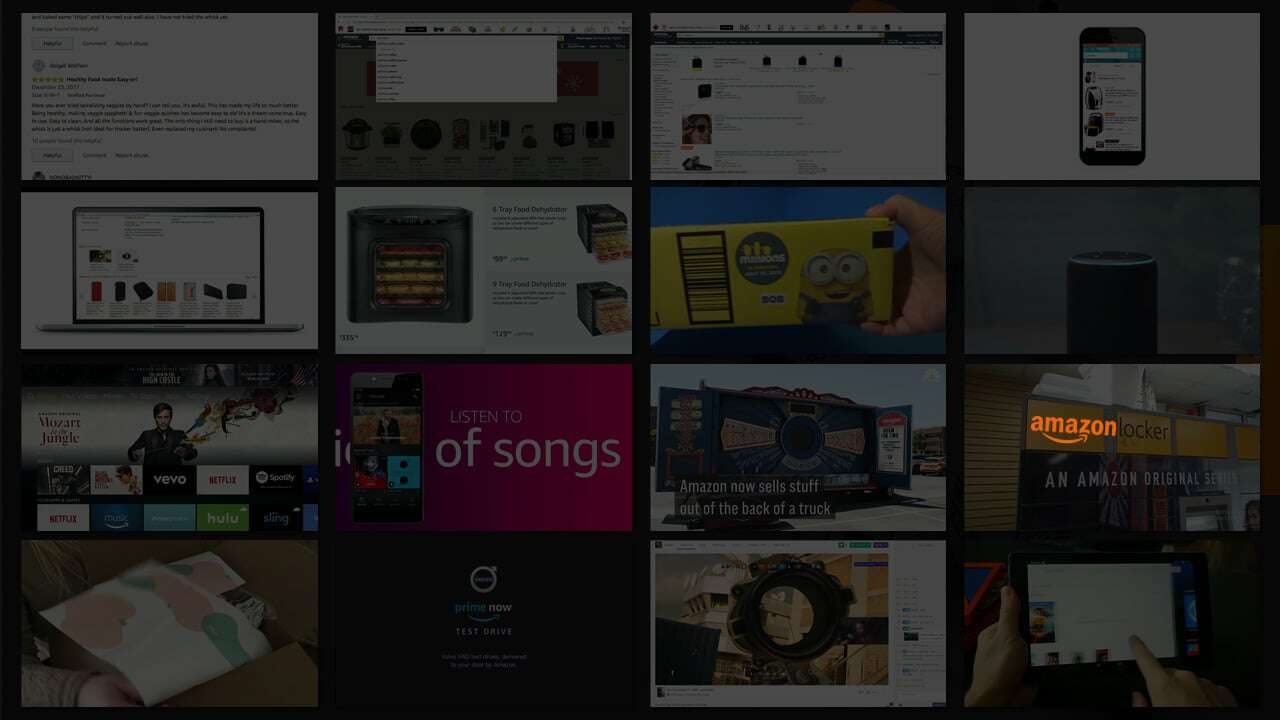What’s Next For Amazon In… Advertising
WARNING – This article is NOT about Amazon Sponsored Ads / Search / PPC, but looks into the future of Amazon’s broader advertising offering.

Imagine visiting amazon.com for the very first time. Not in 1995, but right now, knowing everything you know about the internet and the world, but nothing about Amazon. You’d arrive at the homepage and see a wide search bar right in front of your eyes and think “whatever this site is, and whatever Amazon does, they want me to search.” The network of Amazon brands, businesses, devices and services may be large, but it’s no accident that search is the focal point of the brand at the heart of its ecosystem. It matters – a lot.
But what if Amazon decided to go really big with search – like, Google big. And what if the way it was doing it wasn’t by throwing money and people at it (though there’s that, too), but by reframing the way we think about search and the role it plays in our lives?
In the first post in a new series in which we get out our crystal balls and ponder where Amazon could go next with its channels and verticals, we ask some pressing questions about Amazon’s approach to search: where it is now, where it could go next, and what (and who) is standing in its way.
Google doesn’t just own search – it is search. The verb ‘google’ has been in the Oxford English Dictionary for almost 15 years, and as of right now, according to Statcounter, Google has 91.98% of search engine market share worldwide (the next biggest, Microsoft’s Bing, has 2.55%). So anyone looking for a piece of the search action might as well pack up their bags and go home now, right?
Well, maybe not, and there are several reasons why that might be the case – and why Amazon might be the one player in the market who can take on the king, or even shift the paradigm so far that the king doesn’t even know it’s being taken on…
Amazon has been here before, in a sense. In 2004, Amazon launched a web search portal called A9.com. The search portal functionality was scrapped in 2008, and as of 2019, A9.com redirects to amazon.com, though the A9 name (derived from algorithm: nine letters beginning with A) is still used to refer to Amazon’s search algorithm and the team that works on it.

But this time Amazon has the numbers on its side: in Q2 2018 it hit a milestone figure, with over 50% of online product searches in the US starting on the site; more than 100 million Alexa-integrated devices are in the hands of the public; and its ecosystem of brands and companies numbers in the hundreds.
Through its product search (and associated e-commerce) dominance, Amazon’s understanding of consumer intent and behaviour offers an extraordinary number and depth of data points. FireTV, Prime TV, Amazon Music, Kindle and Audible help Amazon build a detailed cultural understanding of its audience and consumer base, while Alexa is answering questions around everything from the weather through to local restaurants and far-flung holidays. It’s effectively performing millions upon millions of constant consumer polls, and feeding the findings into its own products, services and device development.
In its early guise, Alexa was focused on skills and specific verticals, but it’s shifted – and continues to shift – to a more conversational product. The combined effects of the global coronavirus pandemic – widespread lockdown promoting both reliance on e-commerce (and Amazon dominance) and vastly increased numbers of people staying inside their homes for much of the time – have created a platform, and a big opportunity, for Amazon to become yet further entwined in people’s lives.
For an example of that already being the case, consider the fact that non-product focused search queries are growing on Amazon since the start of the Coronavirus pandemic – it’s become so integrated into people’s lives that they’re searching for things they can’t buy on it, like Disney +, Zoom and Facetime. Admittedly, this likely factors in search results from Amazon’s app store, but this, plus Alexa’s dominance of voice assistance, suggests a behavioural shift is taking place.

Of course, it’s no secret that Alexa is a big play for Amazon. In 2018 the Wall Street Journal reported there were more than 10,000 people working on it, and the company’s VP for Alexa, Steve Rabuchin, told Business Insider last year that “”We’re so bullish on voice as the future. It’s just so early for voice, and Alexa is great, but there’s so much more that we want her to be able to do in terms of being more interactive, more conversational, and just getting better and better and better.”
If that weren’t enough, a 90-second 2020 Super Bowl ad spot for Alexa – with 30 seconds of broadcast time costing an average of $5.5m, you can do the math – is a serious statement of intent on the back of similarly grand outlays in previous years.
The question is, when will Amazon really unleash its full voice capabilities, or is its development – as Rabuchin suggests – incremental? Will Alexa organically insinuate itself into our lives to the point where we suddenly realise we’re having 15 lengthy conversations with our Echo, Echo Auto and Fire TV cube every day?
Jumping forward into a post-lockdown world for a minute, let’s say you want to book tickets to the new Star Wars movie. In the past you’d have invoked the relevant cinema-booking Alexa skill – from Fandango, for example – and asked where and when Star Wars is on. Alexa might have told you it was on at a nearby Cineworld at 7.30pm. Would you like to buy tickets? Yes, two. And that is where things would have ended.
As of 2019, however, things have moved on. For starters, the clunky process of trying to remember what skill you need for a particular task then actually using it has gone. Instead, you ask Alexa a question and the relevant skill is algorithmically selected for you. And once you’ve booked your tickets, Alexa might ask whether you want to find a restaurant near the movie theater. Italian, 9.30pm? Great, that’s booked, now how are you getting home? Do you want Alexa to book an Uber for you?

Alexa has pivoted from answering questions to leading and prompting the conversation, and since Amazon likely holds more data than anyone else about you, your interests and your lifestyle, its power to predict your needs is unequalled – even by Google.
Perhaps the key to search dominance is to consider search in a different way. When we think of search we think of a plain page with a box. To populate that box you need to perform some mental gymnastics to translate your needs into a phrase the search engine will understand. When we don’t get the answers we want, we rephrase the words and try again. And again. It’s extremely frustrating.
Because as brilliantly honed as Google’s search algorithm has become, the consumer still has to work too hard to be understood – which presents a big opportunity to the right company or person. With a search solution that’s more proactive, more intuitive and more predictive, it should be possible to know what a consumer wants and present products to them before they consciously go to the effort of typing words into a search engine.
Where Google has built its success on getting us to a destination from a term or a question, Amazon is in an enviably strong position to anticipate our needs and take us there. And that’s likely to mean not just within its own walls, or within its own ecosystem, but beyond. How Amazon monetizes that, of course, is yet another big question.
Of course it doesn’t, but Alexa’s direction of travel indicates an appetite to engage in the world beyond Amazon, which could see Amazon effectively acting as an affiliate. That would seem to fly in the face of Amazon’s customer-centric approach, but perhaps looking at this through the traditional affiliate-vendor prism makes less sense if Amazon is intent on flipping the conversation around search and consumer intent on its head.
That’s especially true if you consider Amazon’s big drive to put Alexa at the center of our daily lives and culture. The only way to achieve that would be to uncouple the relationship between Alexa and voice activation, and move towards Alexa as a user’s representation – an avatar – within the Amazon ecosystem; an avatar that knows you intimately and has all the information it needs to help you make better decisions about many and varied aspects of your life. In that scenario, even when Alexa’s directing you beyond the Amazon world, you’ve never really left it at all.
That represents a fundamental step away from what Google, even taking Google’s own ecosystem into consideration, currently does. And it might just be why Amazon could conceivably take on Google at its own game and win – by changing the rules, and maybe the whole sport, completely.

WARNING – This article is NOT about Amazon Sponsored Ads / Search / PPC, but looks into the future of Amazon’s broader advertising offering.

This original Op-Ed was written by Podean Global CEO Travis Johnson for The Drum and can be found here.

4 min read
Amazon offers a unique service that has helped create massive amounts of savings for its users since its launch in 2006. FBA, or Fulfillment by...
